Goodbye Deponia – Review
by Edward

|
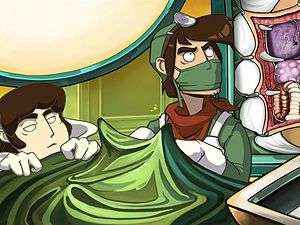 Saying goodbye is never easy; you reflect on all the times you’ve had together while a solemn music track plays as you disappear into the horizon and the credits begin to roll. If you’re not a character in a movie or television show with a downer ending, then it’s perhaps even harder. Case in point: when Lorna reviewed Edna & Harvey: The Breakout back in the ancient year of 2011, I had no idea that it’d help re-ignite my love for point-and-click adventures in a big way, especially with Telltale showing their first signs of abandoning the genre in favour of linear narrative storytelling experience. An insane romp created by a German developer nicknamed ‘Poki’ as part of his dissertation, Edna & Harvey showed that sometimes the best adventures are the most irreverent ones.
Saying goodbye is never easy; you reflect on all the times you’ve had together while a solemn music track plays as you disappear into the horizon and the credits begin to roll. If you’re not a character in a movie or television show with a downer ending, then it’s perhaps even harder. Case in point: when Lorna reviewed Edna & Harvey: The Breakout back in the ancient year of 2011, I had no idea that it’d help re-ignite my love for point-and-click adventures in a big way, especially with Telltale showing their first signs of abandoning the genre in favour of linear narrative storytelling experience. An insane romp created by a German developer nicknamed ‘Poki’ as part of his dissertation, Edna & Harvey showed that sometimes the best adventures are the most irreverent ones.
Last year, Daedalic gave us not one, but two instalments of a trilogy set on a fictional planet of trash known as Deponia and starring Rufus – one of the most cocky, arrogant and yet somehow lovable protagonists in recent memory – and his never-ending attempts to escape for the floating city of Elysium. While his antics are an absolute joy to behold for the player, he’s a clumsy, work-shy fop whose actions recklessly endanger all those around him, and none more so than Goal. Over the last two games he’s accidentally shot her out of the sky, broken her mind, split her into three distinct personalities, and almost doomed her to be blown up with the rest of Deponia so that the Elysians can make their way to Utopia. With that, the trilogy comes to a close with Goodbye Deponia, a heart-breaking farewell that’ll keep the memory of Deponia fresh in your mind for years to come.
Set not long after the events of Chaos On Deponia, Rufus and Goal have only one more day to get to the Council of Elysium Elders in order to warn them that Deponia is in fact inhabited, thus saving it from its imminent destruction. However, in true Rufus fashion, anything that can go wrong will, and in attempting to save the world he accidentally puts Goal back in the firing line. After a brief encounter with the Organon forces and Barry – Rufus’ greatest fan with a strange ability to find himself in places you’d never expect, allowing players to catch up with the plot as exaggeratedly told by our boastful hero – their ascent is thwarted again, leaving Rufus and co to re-group and try another plan of attack. Unfortunately, even their attempts at a brief respite are threatened by the re-emergence of Cletus, Goal’s fiancé with a surprising resemblance to our protagonist, except with a goatee – that’s how you can tell he’s evil.
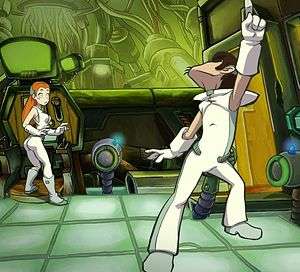 What follows is a hilarious series of cases of mistaken identity – both deliberate and accidental – and it’s clear even in the early stages that the humour is alive, kicking, and with plenty of evolution thrown into the mix as well. The now-familiar tutorial is a hive of fourth-wall destruction, the opening chapters are a never-ending torrent of quirky characters and ridiculous humour, and Rufus’ shtick still feels fresh and provides plenty of brilliant moments even after two whole games. Barely a scene or conversation will go by before the final act that doesn’t raise a smile, and there’ll be plenty of moments where belly laughter becomes the only recourse. While it’s easily one of the funniest games you’ll ever play, there are moments where the machine-gun torrent of jokes may not hit for everyone, and the second act has plenty of moments that will be troublesome for the more conscientious gamer.
What follows is a hilarious series of cases of mistaken identity – both deliberate and accidental – and it’s clear even in the early stages that the humour is alive, kicking, and with plenty of evolution thrown into the mix as well. The now-familiar tutorial is a hive of fourth-wall destruction, the opening chapters are a never-ending torrent of quirky characters and ridiculous humour, and Rufus’ shtick still feels fresh and provides plenty of brilliant moments even after two whole games. Barely a scene or conversation will go by before the final act that doesn’t raise a smile, and there’ll be plenty of moments where belly laughter becomes the only recourse. While it’s easily one of the funniest games you’ll ever play, there are moments where the machine-gun torrent of jokes may not hit for everyone, and the second act has plenty of moments that will be troublesome for the more conscientious gamer.
By the time the credits have rolled, you’ll have forced a psychiatrist to recommend suicide to your ex-girlfriend, essentially sold a black woman into slavery and wanked off a paedophile. Out of context, these moments sound like the next big controversy waiting to happen but, when taken on board with the rest of the trilogy, they don’t seem nearly as bad. In fact, you’re more likely to laugh, realise what you’ve just laughed at, and then question if you should have before you’re moved onto the next series of jokes with wild abandon. The humour comes at you thick and fast and, while there’s every possibility that those aforementioned moments may cause you to turn your nose up in disgust, there are so many jokes that do hit their mark that you won’t mind the misses as much. Even then, considering that Chaos felt a lot darker than the first part, Goodbye’s more contentious moments feel like a more natural transition in context than they do on paper.
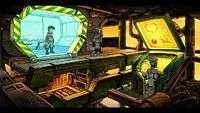 |
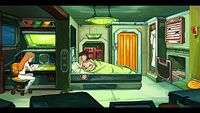 |
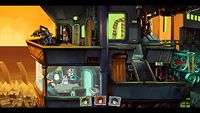 |
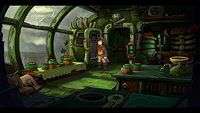 |
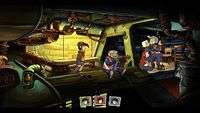 |
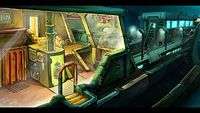 |
In true finale fashion, everything has been thrown at the wall in the hopes it’ll stick, and so the more contentious moments aside, there’s jokes of every kind, from elaborate brick jokes that have been set up over the trilogy, pot-shots at other titles and enough self-referential moments to scatter the fourth-wall to every corner of the globe. Within five minutes you could have Rufus encounter a Laundry Room Cult, call out a stupid puzzle from Daedalic’s A New Beginning, tell you there used to be a really funny joke here in the German version that didn’t work in translation, and then end up in a corridor kerfuffle that’d make Scooby Doo proud.
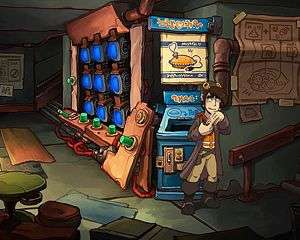 That latter moment is one of several mini-games that Daedalic have seen fit to include in Deponia’s final chapter, prompting the player to take more of an active role other than pointing and clicking this time around. Not only will you have to chase people around a corridor, but you’ll also have to play the role of your doppleganger’s mirror as he brushes his teeth, remove and re-insert his organs in the name of surgery, and rouse the spirits of the Organon with a passionate hymn. While these are fun diversions, they can slowly lose their charm if you’re not sure how best to proceed; watching Shaggy and co run in one room and come out another was charming for thirty seconds at a time, but when Rufus and his would-be captors have been running around for almost five minutes, the joke loses a little bit of its lustre.
That latter moment is one of several mini-games that Daedalic have seen fit to include in Deponia’s final chapter, prompting the player to take more of an active role other than pointing and clicking this time around. Not only will you have to chase people around a corridor, but you’ll also have to play the role of your doppleganger’s mirror as he brushes his teeth, remove and re-insert his organs in the name of surgery, and rouse the spirits of the Organon with a passionate hymn. While these are fun diversions, they can slowly lose their charm if you’re not sure how best to proceed; watching Shaggy and co run in one room and come out another was charming for thirty seconds at a time, but when Rufus and his would-be captors have been running around for almost five minutes, the joke loses a little bit of its lustre.
Similarly, the teeth-brushing is a great idea, but mimicking the speed of Cletus’ hand movements requires more precision than you’d think, which can irritate after a while. Alleviating that potential stress is the ability to skip these mini-games – with the option made available as soon as they start – but doing so prevents you from earning the achievements that come with them, as well as making you feel a little bit stupid into the bargain. It’s great that there’s the option to skip if players are finding themselves stuck, but it also exposes the lack of a hint system outside the confines of these mini-games, meaning that there’s no such luck for those stuck on the regular puzzles.
Not that you’ll find yourself stuck often, at least not as long as you would have been in the past. There are still moments – as there are in every point-and-click – where you’ll find yourself on the verge of hitting a brick wall, but the puzzle design this time around feels more compact, preventing situations where you feel forced to use everything in your inventory on your surroundings until you luck into a solution. In a series where outlandish solutions reign supreme and the player is specifically trained to think in as reckless and ridiculous a way as Rufus, there aren’t any moments where it feels like the answer made sense only to the developers; everything feels a lot more in tune with the logic of the universe, and so the difficulty feels perfectly balanced where it’s challenging, without holding your enjoyment to ransom if you can’t figure out the solution just yet.
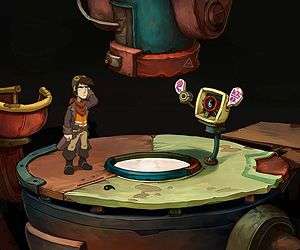 In fact, this problem never comes up in the second act, as Rufus decides that the only way to save the planet and the girl of his dreams is to clone himself twice over, allowing players to swap between three versions of Rufus, each as incorrigible as the last. Each Rufus is then given their own area to explore, allowing the player to swap between them at ease and dictate their own pace, to an extent. Certain puzzles require our heroes to exchange items, which they can only do after finding a mutual point where they can interact with each other. Once they’ve found each other and swapped items in person, they’ll be able to do so remotely in future, making trading as simple as selecting the Rufus you need the item from, opening his inventory, then moving that object to the other Rufus’ icon at the bottom of the screen.
In fact, this problem never comes up in the second act, as Rufus decides that the only way to save the planet and the girl of his dreams is to clone himself twice over, allowing players to swap between three versions of Rufus, each as incorrigible as the last. Each Rufus is then given their own area to explore, allowing the player to swap between them at ease and dictate their own pace, to an extent. Certain puzzles require our heroes to exchange items, which they can only do after finding a mutual point where they can interact with each other. Once they’ve found each other and swapped items in person, they’ll be able to do so remotely in future, making trading as simple as selecting the Rufus you need the item from, opening his inventory, then moving that object to the other Rufus’ icon at the bottom of the screen.
As a result, the pacing is immaculate, and if you find yourself stuck then it’s often just a case of moving inventories around or progressing in the story with another Rufus. The puzzle solutions are also often ingenious as a result, and you’ll lose count of the number of times you’ll find a grin on your face after solving another brain-teaser. It’s a great evolution of the personality-switching mechanic in Chaos On Deponia, with the only real offset being that Goal takes far more of a back-seat in this instalment as a consequence of the story. In truth, swapping between three versions of Rufus only shows up in one chapter of the story, so the mechanic never has time to outstay its welcome, and means that Goodbye Deponia has even more variety in its puzzles than its rivals and predecessors. Even though it took me just over eight hours to finish, there was far more variety and content in that time than in several point-and-clicks put together, with far better pacing, humour and puzzle design to boot.
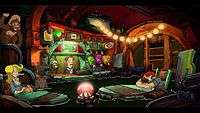 |
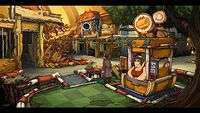 |
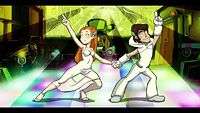 |
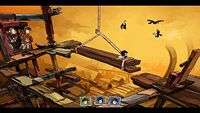 |
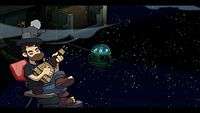 |
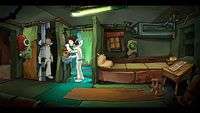 |
As a series finale, you’d be hard pressed to find one better than Goodbye Deponia, as it feels like Daedalic have done everything they could to send the trilogy off with a bang; all the puzzles feel more intelligent, the jokes never seem to end, and it’s so finely written that the final act’s transition into a serious tone fits perfectly. If any complaint could be levelled at the previous Deponia titles, it’s that the endings often left something to be desired, with the first part ending on a massive cliff-hanger with nothing resolved, and the second resolving some of the more immediate problems, but with one moment that felt like a cop-out. In comparison, Goodbye Deponia is easily the best ending of the three, and one of my favourite endings of the year. It’s a brave turn which – when considering Poki’s suggestion that the entire series is a metaphor for something else – kept me awake for several nights just thinking about it.
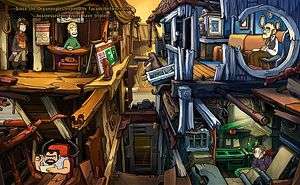 Goodbye Deponia doesn’t just have the series’ best writing, but also Daedalic’s best voice-acting yet. I couldn’t recall any moments where lines were flatly delivered or performed poorly; there’s been a very conscious effort to eradicate the issues that have plagued Daedalic’s non-Deponia titles, aided by the fact that Poki helped oversee the English voice-acting sessions to help make sure each line was delivered as it was intended to. As such, it’s leaps and bounds above that of Memoria and The Night of The Rabbit, and means you’re not jarred or taken out of the action by an oddly-delivered line.
Goodbye Deponia doesn’t just have the series’ best writing, but also Daedalic’s best voice-acting yet. I couldn’t recall any moments where lines were flatly delivered or performed poorly; there’s been a very conscious effort to eradicate the issues that have plagued Daedalic’s non-Deponia titles, aided by the fact that Poki helped oversee the English voice-acting sessions to help make sure each line was delivered as it was intended to. As such, it’s leaps and bounds above that of Memoria and The Night of The Rabbit, and means you’re not jarred or taken out of the action by an oddly-delivered line.
Where you’ll also see no complaints are from the perpetually-stellar art style and music; neither have ever disappointed in the Deponia series, and the soundtracks to the first two instalments still get regular rotation to this day. Once again, the music fits each locale perfectly, and there are a couple of tracks where I found myself going out of my way to stop and soak in, making the premium content – containing the soundtrack, concept art and an introduction to the world of Deponia written by Barry – an even more attractive prospect. Poki also returns as the singing narrator between chapters, and these moments don’t disappoint, proving to be far more catchy, varied and memorable than those in Chaos On Deponia – I’ve found myself singing the final song on numerous occasions.
The art is still beautiful, with Daedalic fast becoming synonymous with beautiful vistas and the screen-shot button being pounded into submission. Barely a location change or cut-scene went by without me compulsively taking a picture, with every scene and moment filled to the brim with detail. Mere descriptions don’t do them justice, and even in this final chapter there are plenty of moments where just the art alone will leave your mouth agape.
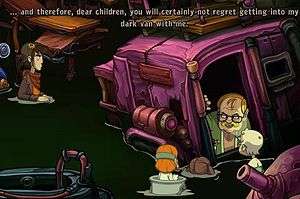 If – like me – you find yourself unable or unwilling to let go, then Goodbye Deponia has several methods to draw you back in. For one, there are platypus eggs scattered about, hidden within certain environments for those who like their collectables, although Drogglejug mode doesn’t make a return from the first game. Plus, as in Chaos on Deponia, there are plenty of achievements that don’t just rely on linear progression through the story – often requiring players to use items or make particular dialogue choices that you wouldn’t particularly think of, with the achievements acting as a reward for experimentation and discovering hidden jokes.
If – like me – you find yourself unable or unwilling to let go, then Goodbye Deponia has several methods to draw you back in. For one, there are platypus eggs scattered about, hidden within certain environments for those who like their collectables, although Drogglejug mode doesn’t make a return from the first game. Plus, as in Chaos on Deponia, there are plenty of achievements that don’t just rely on linear progression through the story – often requiring players to use items or make particular dialogue choices that you wouldn’t particularly think of, with the achievements acting as a reward for experimentation and discovering hidden jokes.
Saying goodbye isn’t easy, and reflecting on all the good times had with the Deponia series would take far longer than a solemn music track playing as I disappear into the horizon, cueing the credits. In its own right, Goodbye Deponia stands taller than every other point-and-click in recent memory, and as a finale you could scarcely hope for better. Although I’ll have a hard time letting go, it’s an adventure that will hopefully stick with you for a long time to come and prove there’s plenty of life in the genre yet.
Pros- Beautiful art style that'll have you compulsively hitting the screen-shot button.
- A script so hilarious that barely a conversation or event will go by without you grinning or laughing like a loon.
- Amazing voice acting that doesn't put a foot wrong and helps bring the already-excellent script to life.
- Ingenious puzzles helped immensely by the multiple-Rufus mechanic.
- Stellar soundtrack filled with catchy tunes from the narrator and composer alike.
- Takes on board criticisms of the past and learns from them.
- A more than fitting end to the Deponia universe.
- That Ending.
- Lack of a hint system for non-mini-game puzzles may be a stumbling block.
- Some mini-games can start to drag if you don't solve them quickly enough.
- Some players may not like some of the darker, more controversial jokes.
- There's no more Deponia to look forward to anymore.
After both Deponia and Chaos on Deponia turned out to be two of the best point and clicks in memory, you'd be forgiven for worrying that Goodbye Deponia wouldn't live up to the hype. Instead, it's a multiple-laugh-a-minute adventure that improves on the incredibly few problems of its predecessors, provides plenty of variety in its gameplay and exercises your brain cells as much as it tickles your funny bone. If you've never delved into the world of Deponia before, then you should definitely play the previous two to better appreciate the finale, but trust me when I say it's more than worth the wait. Goodbye Deponia is a near-perfect ending to the point-and-click genre's greatest trilogy.
Last five articles by Edward
- Best of 2015: Journey's End: A New Beginning
- Journey's End: A New Beginning
- You Can't Choose Your Happy Ending
- Okay, Let's Fix Comedy In Games - The V-Effekt
- Time Keeps On Smashing Away


















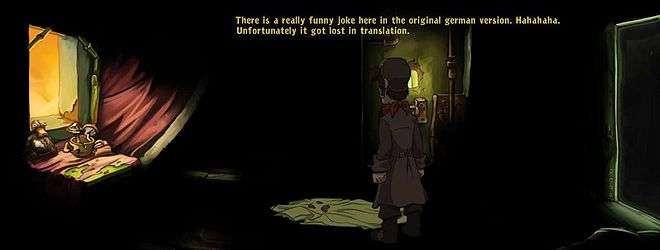
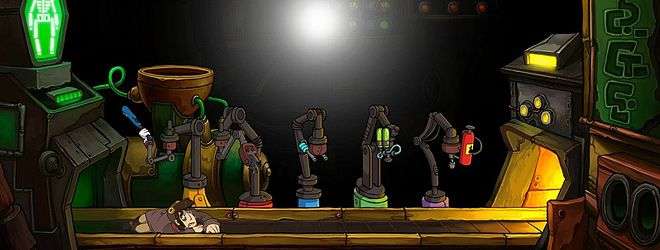
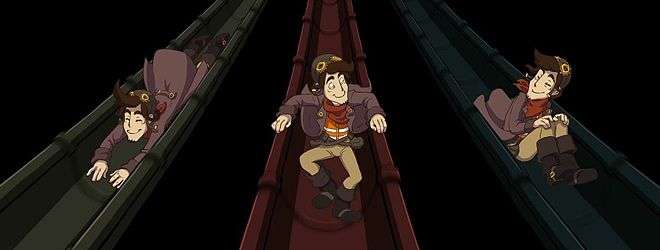






I love the series, and loved this game but was pretty pissed off at how it ended. >:(
Like you I must have taken a million screenies, and even turned off the subtitles to get better shots, something I rarely do in games. I got pretty stuck in the middle section for a long time until I figured out how to progress. Turns out it was just one small thing that was impeding all three Rufus’, an entire web of puzzles choked at one point. Frustrating, but my own fault.
I love the second game the best though, three times the Goal and lots of cool platypuses. Oh, and it flowed really well too. But by far the most awesome thing was Platypus Bataka and Goal’s costume.
Thanks, Tania! You’ve just robbed me of three games that I’d planned on playing, which Ed deliberately avoided mentioning whether the ending was good or bad so that it didn’t spoil it for anyone, but now I know that there’s not a good ending… so I don’t want to play them.
EDIT: I told Ed my thoughts on what the ending would be, and got it 100% right
The ending was really sad, it felt incomplete too…
Chaos on Deponia was good, but I don’t feel like comparing these games…
I love the gameplay and the humour in it. However the ending was really bad. [Editor's Note: Edited for spoiler reasons] If i knew the ending would be like that, I wouldn’t even begin playing the game.
T_____T THEY NEED A FOURTH GAME TO FINISH THIS OFF!!! CAN’T END IT THIS WAY!!! [Ed: removed for spoilers]. They must have had The Whispered World dude write the ending. [Also edited for spoilers]
I’m really, really not happy with people trying to spoil the ending for other people on this review thread, and I understand that it’s because you’re frustrated with the way it ends and it wasn’t the ending you liked, so here’s a compromise:
I have made a thread on our forums for you all to discuss the ending to your heart’s content and explain exactly why you didn’t like it or did like it, and how you’d have improved it, and you can access it here:
http://www.gaminglives.com/forums/showthread.php/2613-The-Deponia-Series-Spoiler-Thread?p=53227#post53227
That way, you can air your concerns and debate with people without spoiling the entire trilogy for anyone who has an interest in the series (I know our Editor has said spoilers have stopped him wanting to play the series, and I’ve heard as much from other people). Hopefully you’ll join me on the forums
Remember, spoiling the ending of a game in the comments of a review of the game is really poor form and massively unfair to the people interested in it and those who’ve worked on the game for years.